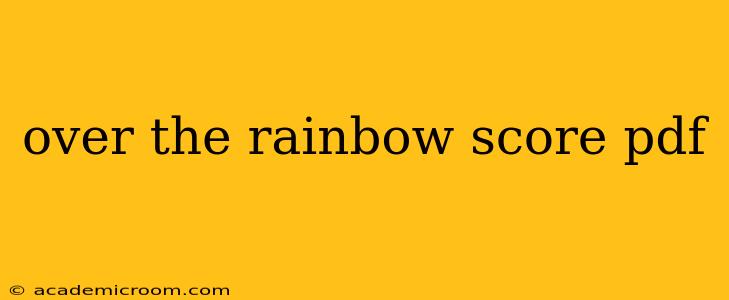Over the Rainbow Score PDF: A Comprehensive Guide to Understanding and Utilizing This Assessment Tool
Finding a reliable and accurate method to assess a child's development is crucial for parents and educators alike. The Over the Rainbow (OTR) assessment is a widely used tool offering valuable insights into a child's overall development, particularly in the areas of social-emotional skills and self-regulation. While a downloadable PDF of the OTR scoring system might not be readily available publicly (as it's often part of a larger training and assessment package), understanding its principles and applications is key. This guide will explore the OTR's core components and answer frequently asked questions surrounding its usage.
What is the Over the Rainbow Assessment?
The Over the Rainbow assessment is a standardized observation-based tool designed to evaluate a child's social-emotional development and self-regulation abilities. It's typically used with children aged 3-6 years, though adaptations may exist for older children. The assessment isn't a test in the traditional sense; instead, it involves observing the child in natural settings – such as a classroom or daycare – and recording their behaviors across several key areas. These observations are then scored to provide a comprehensive profile of the child's strengths and areas needing further support.
Where can I find the Over the Rainbow Score PDF?
Unfortunately, a freely available PDF containing the official Over the Rainbow scoring system is not typically distributed online. This is because the assessment often requires specialized training to administer and interpret accurately. The OTR scoring sheets and materials are typically included within comprehensive training packages or purchased directly from authorized distributors. Accessing the scoring information requires completing the necessary training.
What are the key areas assessed by the Over the Rainbow assessment?
The OTR typically focuses on several key areas of a child's development, usually encompassing:
- Emotional Regulation: This assesses how well the child manages their emotions, such as expressing anger appropriately, coping with frustration, and calming themselves down.
- Self-Control: This involves assessing the child's ability to control impulses, follow instructions, and maintain focus.
- Social Interaction: This evaluates how well the child interacts with peers and adults, including cooperation, communication, and conflict resolution.
- Initiative and Problem-Solving: This examines the child's ability to initiate activities, approach challenges creatively, and find solutions to problems.
The specific scoring categories and the weighting of each area might vary depending on the version or adaptation of the OTR assessment.
How is the Over the Rainbow assessment scored?
The scoring process typically involves trained professionals observing the child and rating their behaviors according to a predetermined scale. The scores are then compiled to generate a profile indicating the child's strengths and weaknesses in each developmental area. This profile helps professionals design targeted interventions or support plans to address any areas requiring improvement. The process is more nuanced than a simple numerical score; it focuses on providing a holistic picture of the child's development.
What are the benefits of using the Over the Rainbow assessment?
Using the Over the Rainbow assessment can offer several benefits, including:
- Early Identification of Challenges: The OTR can help identify potential social-emotional or self-regulation difficulties early on, enabling timely interventions.
- Targeted Support: The assessment provides a framework for developing personalized support plans based on the child's unique needs.
- Monitoring Progress: The OTR can be used to monitor a child's progress over time, assessing the effectiveness of interventions.
- Collaboration: The assessment facilitates collaboration between parents, educators, and other professionals working with the child.
Is there an alternative to the Over the Rainbow assessment?
While the Over the Rainbow assessment is a valuable tool, other assessments can provide similar insights into a child's social-emotional development. These alternative assessments may have different scoring systems and focus areas, so choosing the right assessment depends on the specific needs of the child and the goals of the assessment. Consult with a child development professional to explore the options best suited to your situation.
Conclusion:
While a direct PDF download for the Over the Rainbow score might not be available publicly, understanding the assessment's principles and applications is valuable for anyone working with young children. Its focus on social-emotional development and self-regulation provides crucial insights for early intervention and tailored support, contributing to a child’s overall well-being. Remember to always consult with qualified professionals for assessment and interpretation.
